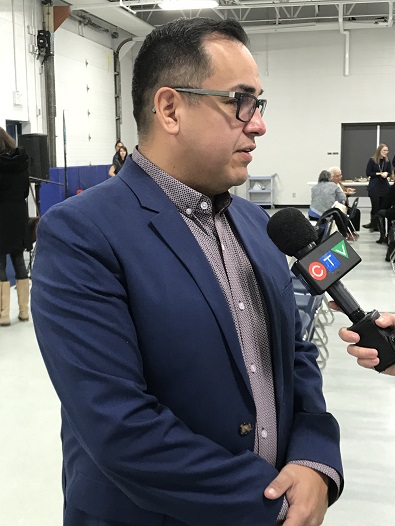Corey O’Soup speaking to media in La Ronge. Photo courtesy of Braden Malsbury.
The province’s children’s advocate uses the thoughts and feelings of youth in the north to lay out a blueprint to deal with the Indigenous youth suicide crisis.
Corey O’Soup unveiled his special report at Churchill Community High School in La Ronge this morning.
The suicide rate for First Nations boys between the ages of 10 and 19 is six times higher than non-Indigenous boys, while the rate for girls is 26 times higher.
In October 2016, six young Indigenous girls in northern Saskatchewan committed suicide. For the past year, the advocate has been meeting with youth in the north to get their perspective and to find solutions.
O’Soup says after meeting with more than 1,000 youth, several themes emerged contributing to youth suicide. Among them, bullying, lack of emotional support, substance abuse, lack of physical safety and lack of activities. Most of the youth also felt their voices were not heard, or they were reluctant to share their real feelings with adults, choosing instead to pretend everything was OK, even though they were dying inside.
With the voices of the youth, he has come up with an action plan to deal with what he calls an extremely urgent situation that requires substantial and immediate help from the local community, the province and the federal government.
O’Soup calls on the province to develop a suicide prevention strategy with the FSIN and Metis Nation. He says the federal government must also be involved, and end the healthcare funding inequity for Indigenous children. Corey O’Soup also wants to be at the table, representing the voice of Aboriginal children. He says Indigenous children and youth deserve nothing less.
“We youth need to be loved. We need to feel like you guys support us, but we need you to understand we are scared of how you will react. We are scared of how you will feel if we tell you how we truly feel,” said a youth participant in the report.
The advocate’s report was also a topic of discussion during Question Period at the Saskatchewan Legislature Tuesday afternoon.
The NDP opposition pushed the Sask. Party Government on the report and Rural and Remote Health Minister Greg Ottenbreit says the government is ready to adopt the recommendations in the report.
“We accept all of the advocate’s recommendations as the pertain to health,” Ottenbreit told the Assembly. “We are fully committed to working with the FSIN, the MN-S and the federal government to implement the changes that are needed.”
Chief of the Lac La Ronge Indian Band, Tammy Cook-Searson, welcomes the report.
“Our health staff and partners have made concerted efforts over the past year into responding to our community needs related to the youth crisis. However, we recognize that these calls of action will set out a more coordinated and sustainable approach that will make a difference in preventing the crises from happening again,” said Cook-Searson.
